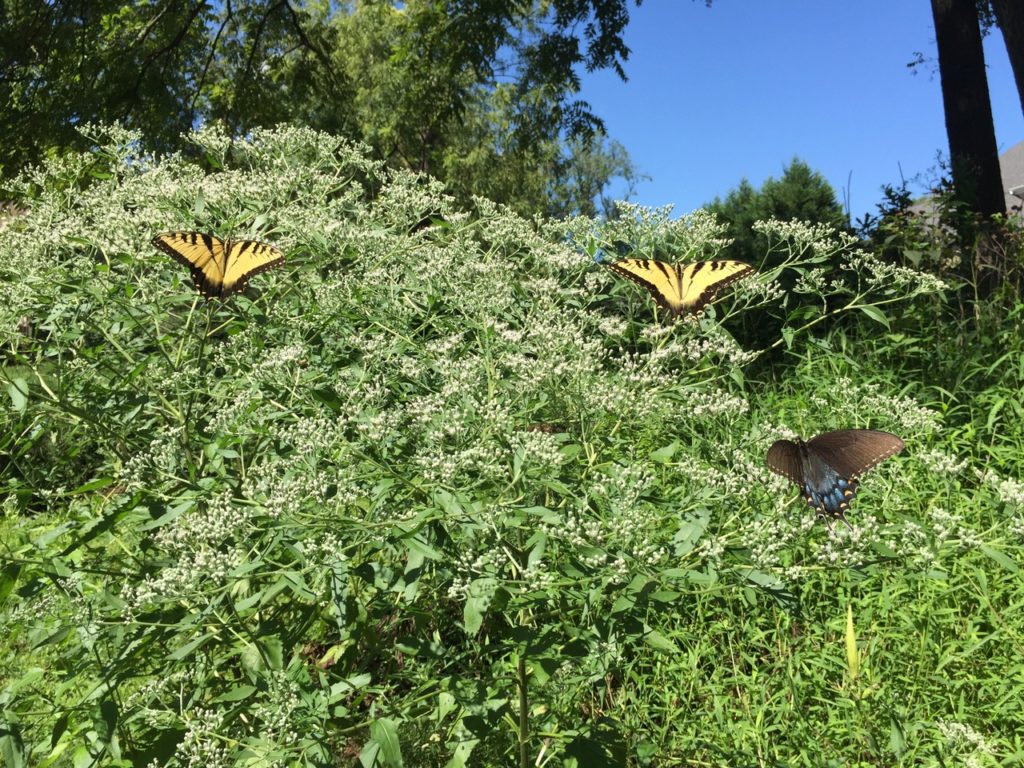Wildlife Friendly Garden Tips
- Reduce or eliminate lawn.
For the lawn you keep, add flowers such as clover, spring beauty and bluets, native sedges, and learn to tolerate native weeds. Mow at a higher level or mow less often. - Leave your leaves.
Autumn leaves create a natural mulch. Many insects lay eggs or overwinter as larvae or adults in leaf litter, and mammals and birds use it for cover. Leaf litter helps suppress weeds, and the soil is replenished with nutrients as the leaves break down. - Keep cats indoors
to protect birds. - Reduce light pollution at night.
Turn off outdoor lights, especially during spring and fall migration season. Light can disorient birds and other night creatures such as bats, lightning bugs, and moths. - Eliminate pesticides, chemical fertilizers, herbicides, and fogging sprays for mosquitos and ticks.
You’ll save money and find that they are not needed and are harmful to people, pets, and wildlife. - Learn to love dead tree snags, logs, and brush piles.
They provide forage, safety, and homes for many insects and birds, and then break down to nourish the soil. - Leave some open dirt.
Many native bees need open ground for nesting sites. - Get excited when you find plant damage from insects.
It means your native plants are doing their job, feeding the insects that depend on them (i.e., milkweed and Monarch butterflies). Plants are rarely damaged by the browsing and will come back to their original splendor. - Leave perennials and grasses standing through winter.
Flower heads can provide food for birds and grasses provide cover for birds and insects. Many insects lay their eggs in the dry stalks of native plants. - Remove invasive plants.
Treat them as noxious weeds. - Plant a diverse range of native plants. The more biodiverse your yard is, the more resilient it will be to pests, diseases, and climate change. Keep cultivars and exotics to a minimum.
- Provide a source of water for wildlife and insects.
- Create layers of plants.
Different creatures prefer ground cover, flowers, shrubs, understory trees, canopy trees, and vines. - Plant for multiple seasons of fruit and bloom.
- Keep mulch three inches or less.
Be careful to not cover tree roots. - Water new native plants as they establish.
They are adapted to the local ecosystem and shouldn’t need watering after the first year or so unless there is a drought. - Keep rainwater on your property.
Stormwater runoff is a major source of pollution in our creeks, rivers, and the Chesapeake Bay and the main cause of erosion. Rain gardens and conservation landscaping, rain barrels, cisterns, and other stormwater management systems are homeowners’ friends. - Prune wisely.
Most trees and shrubs are best pruned in late winter both for their health and the wildlife who use them to reproduce. - Plant a tree.
Or two. Even if you don’t call yourself a gardener or don’t have much time, you can make a big impact on the future this way. Help combat the number of trees that are coming down all over the world. You’ll help with global climate change, cool your own home, and provide multiple benefits for wildlife. - Share your knowledge.
Spread the word to neighbors and friends on the importance of these tips!
